I. Heshun Folk Proverb
Poor people go to Southeast Asia to make money; If people are in a hurry, they go to work in a gambling stone factory.
After frost's descent, suitable for each to find their own direction.
Catalpa blossom, wanderer home.
Three generations without study are like a litter of pigs.
Wealth is difficult to pass down three generations, while the book can be inherited forever.
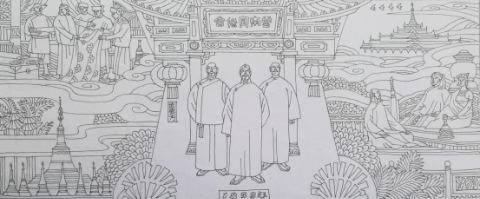
II. The story of Go Yifang: Four dynasties national master
"Go Yifang" refers to people who went to Myanmar and other Southeast Asian countries to make a living and start a business, which was the main way of survival for Heshun people in the past.
In the late Qing Dynasty, Yin Rong, a poor child of Heshun, went to Myanmar and became an apprentice in Mandalay Sancheng. He often went to Myanmar palace to sell silk, the King of Bagan saw him honest and capable, hired him as a national master. Palace "all diplomacy, domestic affairs, business, mostly decided by Yin Rong." Yin Rong designed and supervised the construction of the imperial city for the King of Burma, and mediated the settlement of the dispute between the Burmese royal families. He served as the national master of the Kings of Burma in four dynasties. Li Genyuan, a veteran of the Republic of China, praised Yin Rong in a poem: "Yin Rong of the Qing Dynasty, the kui Star of Myanmar. He was respected by the king of Burma as the national master, and his words were listened to by tens of thousands of people."

III. The story of Go Yifang:Jade King
A Heshun person is hard-working and good at business. In the Daoguang Period of Qing Dynasty, the earliest multinational business “Sancheng” in Yunnan was born here. Several jade Kings were born among the Heshun people of "Go Yifang".
Zhang Deheng (Baoting), from Heshun, works in myanmar jade factory ". He used new mining and management methods to promote superior jade processing to Hong Kong, Guangzhou and other countries in the world, and won the title of "Jade King". In Burma, the British colony at that time, Zhang Baoting was always a righteous advocate for Chinese businessmen, but also committed to the municipal construction of Burma. For this he won the respect of the British people, and the Queen gave him a medal and a white carriage.
Heshun Cun ZunFu (Haiting) is also known as "jade King".He made money while keeping justice in mind.He joined the Tong Meng Hui in Yangon and poured his financial resources into supporting the Yongchang uprising in Yunnan, Hekou uprising, Tengyue uprising and Huanghuagang uprising in Guangzhou.He was praised by Dr. Sun Yat-sen as "the leader of overseas Chinese and the glory of the nation".

IV. Inspirational Chapter:The wife steamed the hat to encourage her husband
Heshun has always had the tradition of "Go Yifang". Men, rich or poor, come to Myanmar as adults to work and do business.
At the end of the Qing Dynasty, there was a scholar in the village who was greedy for the comfort of home because of his fame. He said to everyone he met, "I am a man of honor!" His wife tried to persuade him to no avail. One day at dinner, the wife steamed her husband's hat and brought it to the table. The scholar did not understand, and then the lady said: "You eat your fame!" Xiucai heard this, feel ashamed, and understand his wife's painstaking, then with the villagers to make a living.
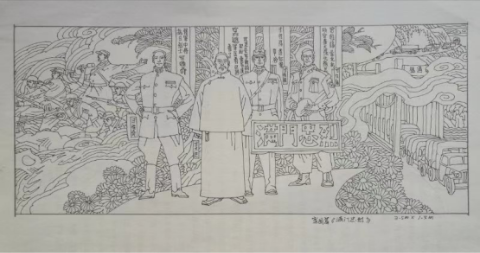
V. Family and Country Chapter: The whole family are faithful people
Tengyue Heshun township, mostly for the descendants of the border garrison soldiers. They uphold the tradition of "only when there is a country can there is a family", regardless of the farmers and businessmen have the feelings of serving the country. Among them, the story that the whole Cun family sacrificed for the country is widely spread.
Inch dajin, martial arts juren in the late Qing Dynasty, served as the garrison of the army.He led the frontier army and people to repel the invading British army many times.Therefore, he was personally rewarded by Guangxu emperor, and won the title of first class Han Army Batulu.In 1942, at the age of 88, looking at tengchong city occupied by the Japanese invaders, he fasted and died under the Leida tree in Xiaoxiluo Qiping village to highlight the national pride.
He had nine sons, all of whom fought in the war, and three who died for the country.
His third son, Chun Xingqi, was known as the "tiger general of the Anti-japanese army".In May 1941, he died in the battle of Zhongtiao Mountain, Shanxi Province, as the commander of the 12th Division of the third Army of the National Revolutionary Army.He was posthumously awarded a lieutenant general.The fourth son, Cun Xinglu, served as lieutenant colonel of the expeditionary Force.He died in the battle of Longling in November 1944.The fifth sonCun Xingffu, as the central lei allow airport garrison battalion colonel.He died in may 1942 when defending Leiyun Airport.
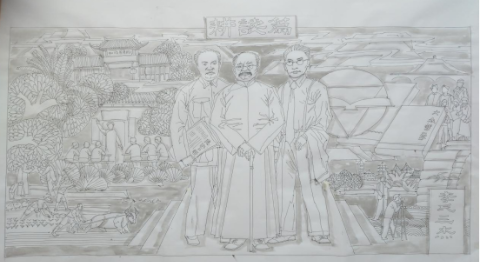
VI. Talented Man: Three Masters of Li
Heshun's culture and education flourished and there were many outstanding people. Li Yuegai, Li Shengzhuang, Li Shengxuan are among the representatives, known as the Three Masters of Li.
Li Yuegai (1881-1944), also known as Zichang, graduated from the Beijing Normal University.He was a member of Tongmeng Hui, one of the founding fathers of the Revolution of 1911 and the Patriotic Movement in Yunnan, and served as the secretary general of the Patriotic Army Chief CAI E.Li Yue Gai was a brilliant writer, and Zhang Taiyan called him "a pen in the south of China".In 1930, Li Yue Gaii served as the first colonial border inspector of Yunnan and led the administration of West Yunnan for nearly 10 years.During this period, he did a lot of practical work for the border areas, such as building roads, mining, water conservancy, education and border survey.
Li Shengzhuang (1904-1945), the eldest son of Li Yuegai, entered Southeast University in 1926 to study Western philosophy.He is an underground member of the Communist Party.In 1928, he went to Yunnan Provincial No. 1 Middle School to teach, and concurrently served as deputy editor of Yunnan People's Daily.In 1930, he became the secretary of the First Colonial Border Office in Yunnan and the curator of Heshun Library.In September 1935, he founded Tengyue Biandi Simple School and served as its principal.In 1937, he founded Tengyue Daily and served as its president.Later, he was transferred to the post of secretary general of provincial government.
Li Shengxuan (1910-1966) was the second son of Li Yuegai.His pen name is Ai Siqi.He is an outstanding classless revolutionist in China, a famous Marxist philosopher and educator, and a loyal fighter of the Communist Party of China in the theoretical front.He pioneered the popularization of philosophy and the Sinicization of Marxist philosophy.His major works include Popular Philosophy, Philosophy and Life, dialectical materialism, historical Materialism and so on.
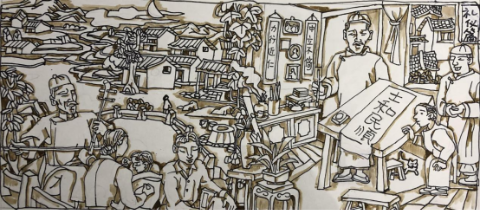
VII. Etiquette: Harmony of the Township
Li Genyuan, a veteran of the Republic of China, wrote a poem praising Heshun: "Nine out of ten people are in Business in Myanmar, and they are the best at making money. The rich here know manners, and this southern town has a lot of celebrities."
During the Reign of Emperor Guangxu of the Qing Dynasty, heshun folk customs were honest, people were law-abiding, and social security was good. Chen Zonghai, tengyue's chief at the time, had not heard of a lawsuit for a long time. He felt puzzled, and went to the countryside to visit unannounced and found that the local customs here are pure and good, even if there are occasional disputes between neighbors, they can also understand each other. He was moved by such gentle and honest local customs, and gladly wrote the four characters "Harmony of the Township" to praise them.
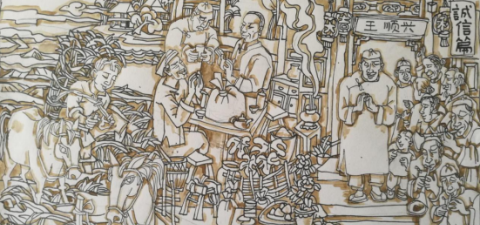
VIII. Integrity Chapter: Picked up the gold and waited for its owner
Yin Qishun, who lost his father when he was young, made a living by mowing horses.When he was thirteen or fourteen, he went to Burma and set up a stall in a market.One day, a big businessman left his cloth bag at Yin Qishun's stall.When Yin noticed, the merchant had disappeared.After that, he keeps the bags safe and keeps the floating stalls in one place, waiting for their owners.Half a year later, the merchant passed by his stall and Yin returned the bag.The merchant opened the sack which he had found, and found all the money in it.He was deeply moved by Yin Qishun's honesty and asked him to be an agent of native products.Other tribal merchants followed that. After Yin Qishun set up "Yushunxing" business.He eventually became extremely rich, rich return home, return home catalpa, gossip.

IX. Persuasion: Modern Education
"Practice loyalty and filial piety and read more sages.""If you don't learn when you are young, you are like animals.Three generations without reading are like horses and oxen.Heshun people have attached great importance to education since ancient times.There were not only traditional schools and libraries, but by the end of the Qing Dynasty and the beginning of the Republic of China, western learning was spreading to the east and new thoughts were rushing in.Myanmar and other countries were under British colonial rule, and many Heshun people lived in Myanmar, so Heshun was influenced by western education.The system of modern education was gradually established in this frontier village.After the Hundred Days' Reform, Mingde Girls' School, the earliest girls' school in West Yunnan, was born here. In 1909, two primary schools were established in Heshun. In 1940, Yiqun Middle School, a famous overseas Chinese school, was founded.It is worth mentioning that in the 1920s, Heshun people clearly put forward and practiced the education proposition of "combining morality, intelligence and physical education".In the late Qing Dynasty and early Republic of China, as many as 12 Heshun people studied in Japan successively.The development of modern education has made Heshun brilliant in modern times.

Ⅹ. Filial: Keep steamed bread in arms to honor mother
Heshun people obey ancient rites and filial piety. Filial son has always been the moral model in the eyes of the villagers; Ang Zhang Zongren is one of them.
In 1707, In the forty-sixth year of the Reign of Emperor Kangxi of the Qing Dynasty, Zhang Zongren, serving as a mission officer of Tengyue Prefecture, did not eat the steamed bread distributed by the official family but put it in his arms.Wu Yue, the official, inquired and learned that Zhang Zongren was carrying steamed bread to honor his mother because he had an old mother who had not been fed.The governor was moved by his filial piety, so he wrote a plaque and couplet to praise him. The plaque: Tengyang is a place full of righteousness and filial piety. Plaque says: fixed province considerable.The plaque and couplet have been hung up by their successors until now.

XI. Diligence and frugality: Rich without forgetting the original
Heshun people praise the virtue of frugality, and both rich and poor regard it as a value they must follow. Diligence and frugality strengthen the will of the meek poor, and the rich remain true to their original purpose.
During the republic of China, the village teenager Yin Qishun went to Myanmar to make a living. He took the good faith as the foundation, and started to work hard and thrifty, eventually became a rich businessman, respected by the villagers called Yin Master. Although he is rich, but eat simple food, wearing cloth clothes straw sandals; still maintain the habit of thrift in those days. The magistrate invited him to the town for council, and he slung a pair of leather shoes over his shoulder and walked to the edge of the town in his straw sandals. Then he washed his feet in the gutter and put them on to go into town. Because of his childhood poor, not a lot of decent clothes, so in order not to wear clothes worn out, he was reluctant to sleep at night. He kept the habit even after he became rich. His story of helping the needy is still being told.
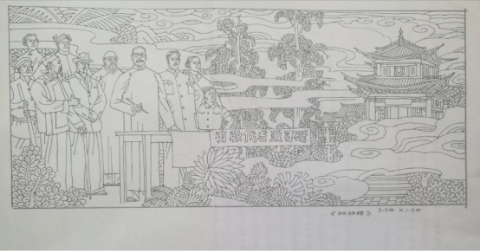
XII. Ecology: Tree Protection Poem "Double Fir Line"
Heshun people, who live between green mountains and clear waters, have always paid attention to the harmony between man and nature.
There are two bare fir trees in Kui Pavilion, which are more than 500 years old.In 1931, someone wanted to cut down the fir trees and use them for private use, was opposed by the villagers. Li Yuegai, the first colonial border supervisor in Yunnan, led the people to protect the two trees and wrote a poem "Double Fir Line", which was engraved on the stone tablet.The poem ended with a line, "Those who cut down the trees will be beheaded," which later became a village rule.Two fir trees have now been included in Yunnan Ancient and Famous Trees.
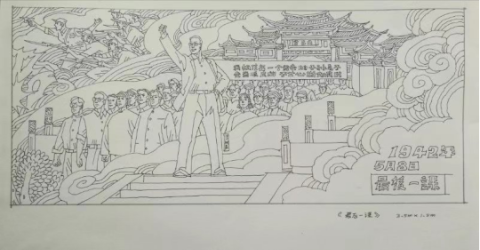
XIII. Family-country: The Chinese Version of "The Last Lesson"
When France was occupied by Prussia in the 1870s, French writer Louis Daudet wrote his famous "The Last Lesson". In May 1942, the Chinese version of "The Last Lesson" was actually staged in Wenchang Palace in Heshun.
On May 8, 1942, Tengchong was about to be captured by the Japanese aggressors.Cun Shusheng (1896-1978), then the principal of Yiqun Middle School, gathered all the teachers and students at Wunchang Palace in Heshun and gave them a "final lesson."He said,"...You know all about the situation.I only hate that we have no strength to defend ourselves, that I cannot protect and lead you!...I hope you will not forget what I have said to you.You should temper your spirit in difficult circumstances and develop your strength in struggle! I believe, every Chinese people, is not willing to be slaves!..."
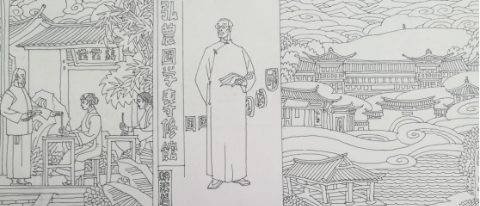
XIV. Cultivated Reading: Respect literature and attach importance to education
He Shun people deeply understand that "reading hard will prosper family".At present, Wenchang Palace still has the "Imperial First-class Inscription tablet of the Two Dynasties", which records 809 Heshun people who made great achievements in the Ming and Qing dynasties.Among them, 8 were Juren, more than 600 were scholars, and more than 180 had served in the imperial court.In the history of Heshun, many literati ran private schools, free schools, secondary schools and girls' schools in the villages.It has been a practice for hundreds of years.Among them, the Hongnong Sinology Special School founded by Mr. Yang Shouyi lasted the longest, from the 1920s to the 1950s.
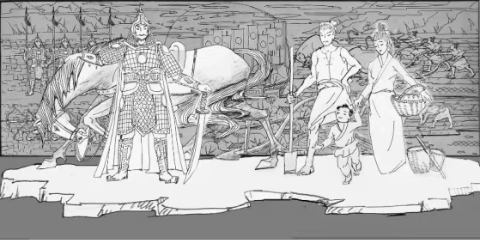
XV. Homeland Chapter: The army defended the frontier.
More than 600 years ago, during the Reign of Emperor Hongwu of the Ming Dynasty, soldiers from Sichuan, Hunan, Jiangsu and Jiangxi were sent to Heshun by the imperial court to defend the border areas.The Ming Dynasty practiced the military collect system, and the army spent "three out of ten practicing and seven out of ten farming".A soldier is a family, known as the "army", can take the family.Once a soldier entered the military register, he could inherit his post from generation to generation, and was assigned to the land by the court.Since the Reign of Hongwu in Ming Dynasty, ten family surnames, including Cun, Liu, Li, Yin, Jia, Zhang, Yang, Chuan, Xu and Zhao, settled down and multiplied here.The Han culture of the Central Plains also grew up here and has been passed down to this day.For six hundred years, each family name has lived in harmony, and the village still has eight ancestral temple.

XVI. Public Welfare: Charity
Being enthusiastic about public welfare is a tradition of Heshun people.After they earn some money, they return to their native land and, in addition to building their own houses, always "do something for the public good" in order to "repay their hometown".Because of this tradition, public facilities are now all over the village, whether it is the gate at the entrance of the alley, platform, ancestral hall, laundry booth, library, primary and secondary schools...These are the testimony of generations of Heshun people's public interest.
Along with their insight and mind, the public welfare of Heshun people has been extended to national justice, such as donating grain and grass and weapons during the 1911 uprising, and donating fighter planes to the state during the War of Resistance against Japanese aggression and the Anti-Japanese War. Public welfare has become the main way for Heshun people to express their feelings for their country and family.

XVII. Diligence: Woodcutting and Reading
The rural spirit of respecting literature and education in Heshun has brought up generations of heshun talents and deeply influenced the foreigners living in Heshun.There was a young man named Yue, whose ancestral home was Qingshui, Tengchong. His parents worked as maids in Heshun and settled in Li Jia Xiang.He was influenced by Heshun country style, although poor, but dedicated to learning, determined to become a talent.In order to complete his studies, he went into the mountains to gather firewood for years and years. He persevered and was admitted to a famous school. He eventually became a famous teacher in the local area and had many excellent students.

XVIII. Inspirational Chapter: Selling tea for rasing children
Yin Yuzhen, wife of Zhang Bingzhao, was widowed at the age of 27 and died at the age of 102, having been widowed for 75 years.After her husband died, she sold tea by the roadside in Ganya (today's Yingjiang County) to raise her children.Day after day, she worked hard to bring up her three sons.The eldest son, Chang Chengrui, was the official of the Central Government.The second son Zhang Chengyao is Fengzheng officer.The third son, Zhang Chengpei, was Wenlin officer.She went on to have eight grandchildren, all of whom made literary achievements.Among them Zhang Li (De Yang) for Guangxu Guimao Juren.Due to her early hardships, Yin was once blind, but regained her sight decades later.After her death, Tengchong educator Wang Kuai wrote a couplet for her, praising her: "The old widow had no choice but to buy tea. Her tea was very mellow; her descendants are all promising."
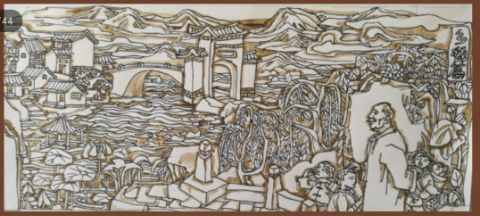
XIX. Homesickness: Paradise in Peach Garden
"The sun is setting, the village smoke is rising, and the pastoral boys are going home.There was laughter by the river. It was girls washing clothes by the river. Young people are leaving home and old people are returning. Mothers are making new clothes for their children and making them cries about leaving home."
"The alley is deep and the old houses are green with moss. The village has built places to read books and pavilions to enjoy the beautiful scenery. Sooner or later, people chase after money. The landscape here can cultivate people's character, just like a peach garden wonderland..."